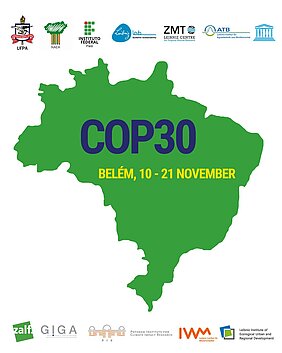The focus lies on creative paths for global climate protection and the concept of systemic sustainability, which views ecological, societal, and economic interconnections as an inseparable whole.
On November 11, 2025, the Healthy Planet – Healthy People Foundation, the International Society for Environmental Epidemiology, the Leibniz Lab "Systemic Sustainability" and the international youth initiative Climate Live are inviting participants to a side event in the Blue Zone of COP30.
Under the title “Integrating Art, Indigenous Wisdom and Science for Climate Action,” international experts will discuss how creative approaches, traditional knowledge, and scientific insights can work together to promote climate protection, health, biodiversity, and social participation.
Speakers include, among others:
- Bareo Hassan, Ministry of Transport of Ethiopia
- Dr. Mary B. Rice, Harvard T.H. Chan School of Public Health
- PD Dr. Marion Glaser, Leibniz Centre for Tropical Marine Research (ZMT)
- Prof. Dr. Markus Huff, Leibniz-Institut für Wissensmedien (IWM)
- Tafadzwa Chando, Climate Live
The event will be moderated by Donald Sandmann, Political Director of the Healthy Planet – Healthy People Foundation.
Dr. Marion Glaser (ZMT) will present two artistic projects in the coastal regions of Amazonia and Bangladesh, which demonstrate how creative practices can bring communities together to exchange knowledge and strengthen skills. They illustrate that art can be a powerful tool for a more sustainable and just future.
“Art can have an impact where facts alone are not enough – it can touch people, stimulate reflection, and open up spaces for collective action,” says Marion Glaser. “When used correctly, artistic processes foster participation, exchange, and empowerment in local communities.”
Prof. Dr. Markus Huff from the Leibniz-Institut für Wissensmedien (IWM) in Tübingen contributes the perspective of science communication. He presents current research findings that show how people perceive, evaluate, and integrate scientific information on climate and sustainability into their thinking.
“We still know too little about what makes climate communication successful. Psychological research can help us understand how people really absorb and interpret scientific information,” explains Huff. The goal is to develop effective communication strategies that can support social transformation.
The Leibniz Lab ‘Systemic Sustainability’ is represented by contributions from the Leibniz Centre for Tropical Marine Research (ZMT) and the Leibniz-Institut für Wissensmedien (IWM). Both institutes initiated and organised their participation together with the Leibniz Institute for Agricultural Engineering and Bioeconomy (ATB), coordinated by the IWM.
Note:
The side event in the Blue Zone is accessible to accredited press and registered COP30

